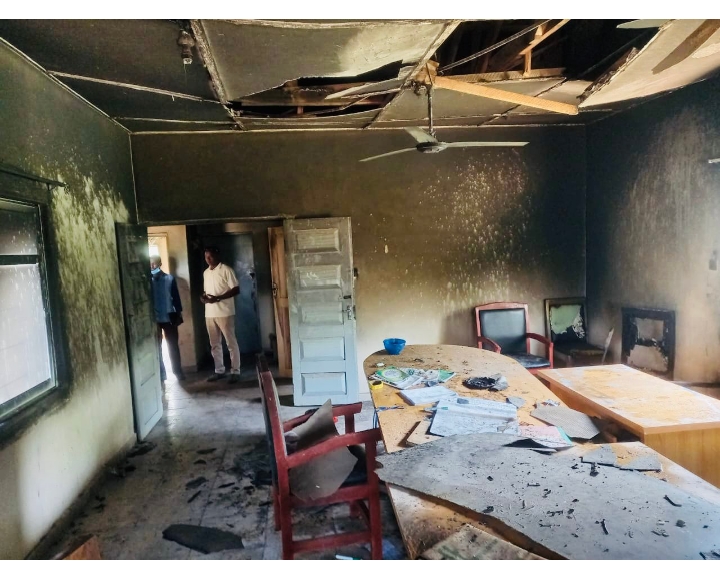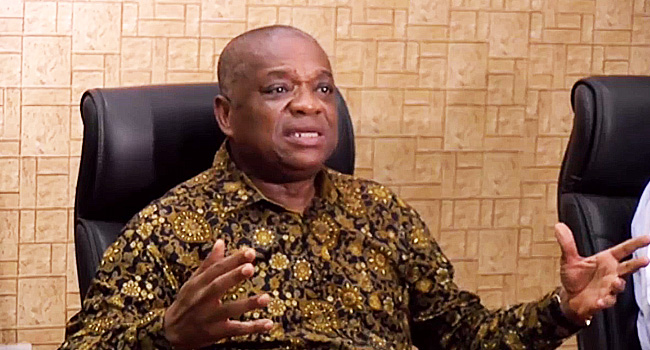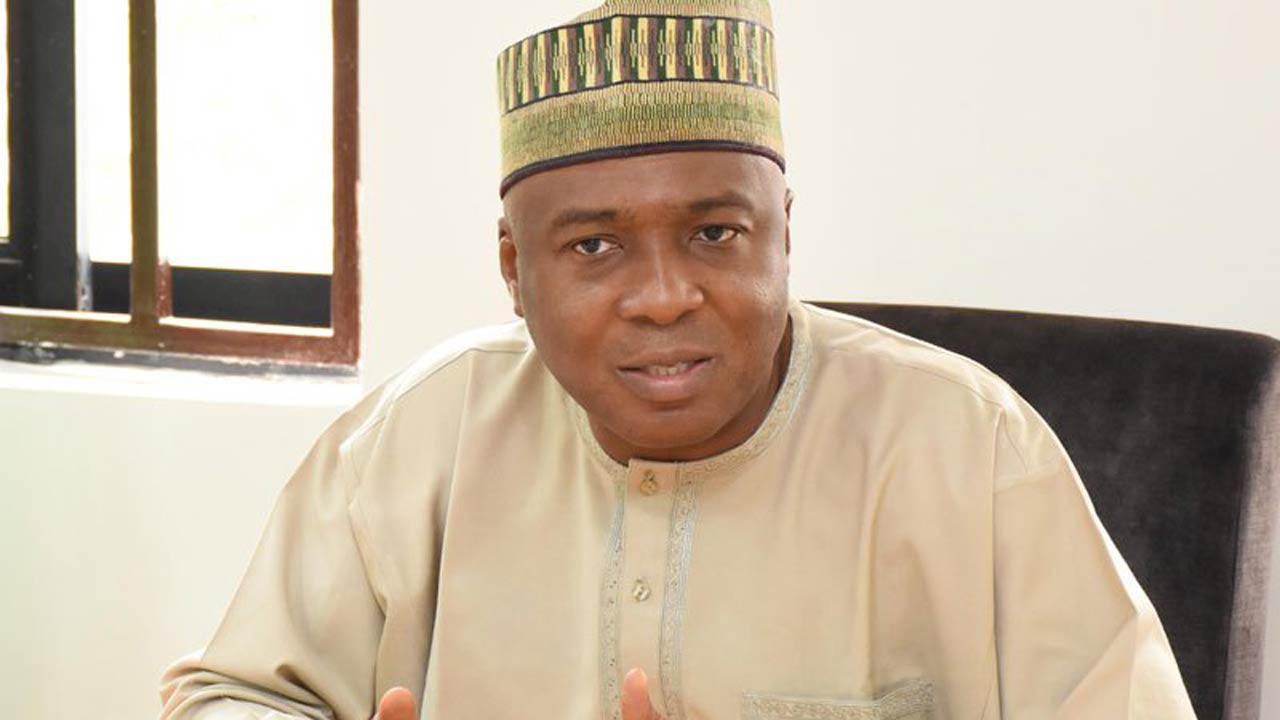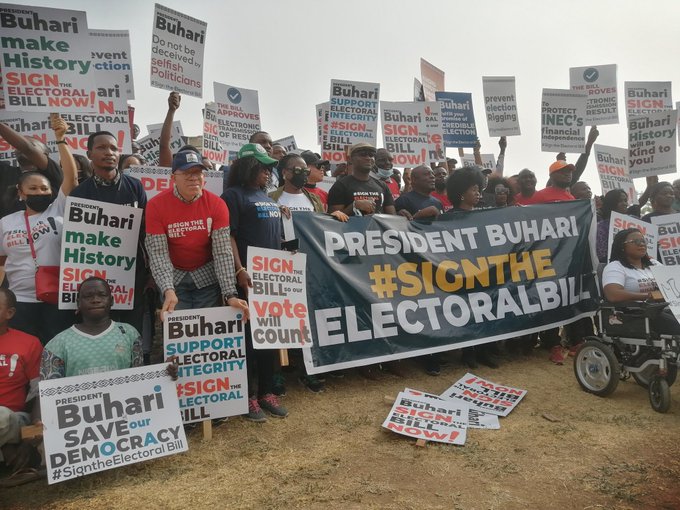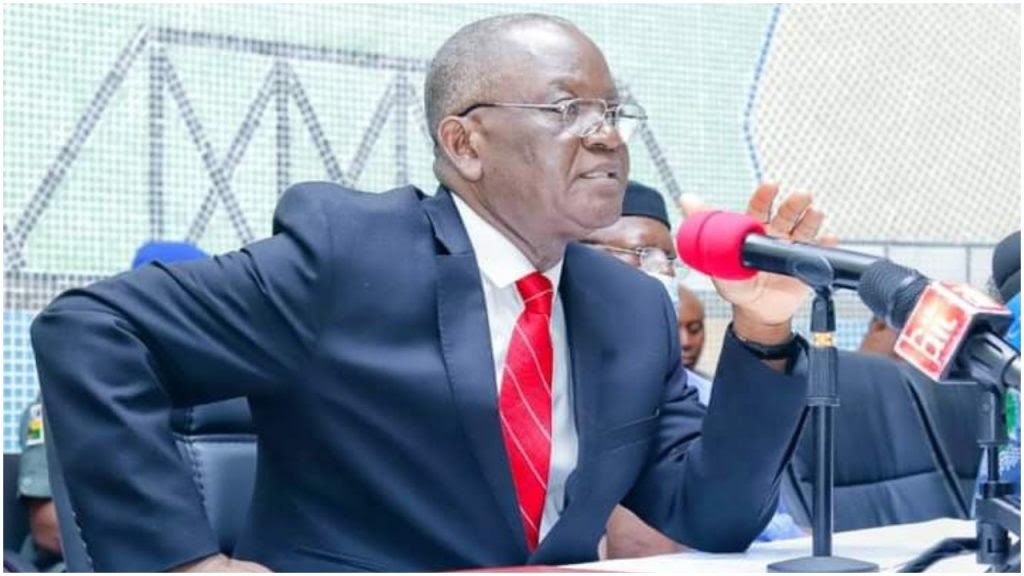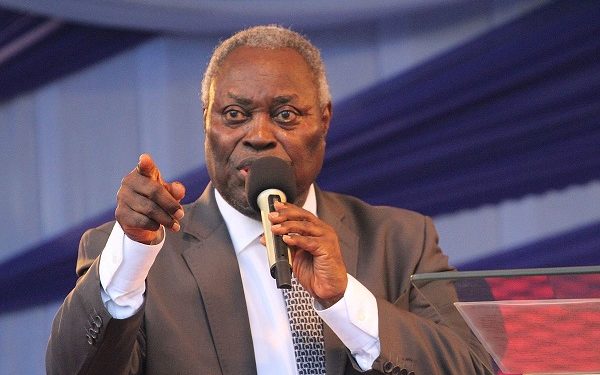The recent presidential nomination primaries of the two big parties and the just concluded Ekiti state governorship elections are united by a paradox. In both, Nigerian democracy recorded some dubious progress. An orderly and fairly credible electoral processes seems to have finally evolved. Correspondingly, however, the monetization of the electoral process hit the highest peak in our history.
In a sickening Arab street bazaar at the presidential nomination conventions, APC and PDP delegates exchanged their convictions for wads of dollar bills reportedly ranging in value from $5000 to upwards of $35,000. In the Ekiti governorship election, the entire state became a retail market place for haggling over the price of each vote and finally settling for a range between N3000 and a princely N15,000 per vote cast.
As things stand, our electoral outcomes are beginning to look more like validations of financial prowess rather than vindications of genuine intentions of public good. In both the APC and the PDP presidential primaries, the two presidential candidates that finally emerged happen to be the richest citizens among the aspirants. In Ekiti, it seems that a well to do candidate backed by the treasury prowess of the incumbent state administration also won. In both sets of elections, therefore, we may have reached that point in our descent into decadence where electoral victories may have acquired a new Nigerian name: Coronation of the Highest Bidder.
At the centre of this aberration is a helpless acceptance of vote buying and selling of votes as a legitimate seasonal trade. As has been variously reported, serial bribing of delegates and retail vote buying at polling sites dominated both exercise. Most observers have concluded that the outcome of the presidential nomination conventions of the two big parties merely confirmed the primacy of cash as the deciding factor in the outcome. This is only a foretaste of what is likely to transpire at the real general elections in 2023.
On the scale of state governorship elections, the Ekiti governorship election now holds the gold trophy in retail direct vote buying and selling. From informed reports, pay masters of the leading candidates were located strategically at vantage points in the vicinities of the polling booths with cell phone cameras focused on the balloting point for verification. Once the voter thumb printed the correct party emblem, he/she qualifies to received the agreed price of the vote at the point of exit from the polling area. Eye contact and thumb signals were the confirmation signals. Reportedly, the going rates in Ekiti ranged from N3,000 to N15,000 depending on the depth of the candidate’s pocket. The highest rate guarantees the more certain win. In one epic unguarded moment, a social media viral photo showed a leading candidate personally openly handing out wads of naira notes to a throng of supporters at a last minute campaign. No one has cared to deny that footage!
In all this drama, we need to accord INEC its deserved credit. It may have finally made election rigging and vote robbery less attractive than ever before. So far, hardly anyone has alleged that either the presidential primaries of the big parties or the Ekiti governorship election was rigged in any material way. The announced results have so far corresponded neatly with the numbers of accredited delegates and voters in each case. INEC’s adoption of new anti fraud technologies seem to be working. In Ekiti, tallying of votes and the issuing of results were completed in about one day. Some INEC staffers still function as facilitators of residual electoral fraud. But most importantly, potential election riggers and vote thieves now need to think faster than INEC and its new devices. That is bad news for habitual election fraudsters and other ugly Nigerians.
In all fairness, INEC’s contract with us ends with delivering credible, accurate, free and fair elections. It has no responsibility when it comes to regulating the conduct of voters and the behaviour of candidates and party supporters. Security s the business of the security people. The brazen monetization of our elections is a matter of social deviance that ought to preoccupy government and the political parties that give birth to them. And yet it is the very parties themselves and their leaders that are the source of the brazen monetization of the electoral process.
We have every cause to celebrate the general acceptance of orderly electoral process as the best way to advance the cause of democracy. Already, lovers and champions of democracy have saluted the progress and success in Ekiti. The United States government has congratulated Nigeria on the success in Ekiti. Even the habitually litigious Nigerian politicians in Ekiti have carefully focused their attention on the open vote buying and selling than on the credibility of INEC’s procedures and processes. The complaint seems to be that they were out bidded in the bazaar!
But we should all be ashamed that our endemic corruption culture has assumed a permanent seat in something as strategic as our electoral process. Democracy dies the moment the choices made at elections do not reflect the genuine wishes and aspirations of the people but accord with a market logic. Worse still, when cash stands between political aspirants and the genuine feelings of the people, it is hard for electoral outcomes to reflect the desirable direction of public policy. The aberration befuddles the real needs and urgencies of the society and fuels the existing decay of the state.
There is yet another way of viewing the matter. As it stands now, the quantum of monetization in the recent electoral contests indicates the emergence of the vote trade as something of a new economic trend and nascent sector. We may in fact have indirectly created a seasonal economic sector with a quantum cash turnover. An industry of sorts has found a place among the gamut of new nefarious undertakings now struggling for prominence in our infinitely entrepreneurial nation.
The trade in votes has just joined the ranks of other illicit trades now thriving in our midst. Cyber crime, trading in babies produced by ‘baby factories’, trade in human body parts, human trafficking across state and international boundaries, online fake celebrity endorsement scams and circuses etc. These are the faces of the ‘new economy’. Add these to the already flourishing lethal sectors of transactional kidnapping and industrial banditry.
The vote trade is the complementary face of our new era politics. Let us call it transactional politics. It is informed by the Nigerian craze of “cash and carry” or “carry go” in popular parlance. The ‘Ghana must go” politics is the unofficial certification of a cargo cult political culture that feeds on compulsive corruption. While the new INEC is the face of a promising future for democracy in our country, the rise of transactional politics is the death knell of democracy as well.
The unscripted understanding is that politicians have no moral obligation to attend to the needs of their constituents once they have bought off their votes at election time. The business of the next four years becomes how to recover the investment made at election time and ensure some return on investment. The avenues for investment recovery are well known in our political economy. Inflated and phantom contracts, dubious claims of perks and entitlements, padding of annual budget provisions, countless official trips and tours to all corners of the earth in the name of either finding foreign investors or learning new tricks in nation building or institution management. There is of course the familiar serial scam of oversight visits to public institutions and departments by federal and state legislators. It is an endless cesspool.
Once sold, the citizens’ vote is a blank cheque that relieves the political office holder of all responsibility for delivery of the benefits of democracy and accountability to the electorate as citizens. The insensitivity of politicians is only complemented by the indifference of an electorate that has sold its votes for a pittance or was absent on election day.
Interestingly, neither politicians nor the general public find transactional politics unusual or minimally offensive. Our politicians have no qualms about openly negotiating or bidding to buy your votes. Neither do voters feel any moral reservations about selling their votes. It is an anomaly that has found a fertile ground in an atmosphere and culture of endemic corruption. The unwritten common wisdom is that the public sphere is a no man’s land, a place where the treasure of the nation belongs to no one and in which politicians once in office are entitlement to help themselves to the public till. Since the citizens’ vote is the only ticket that grants access to the feast called government, politicians and the citizens have vicariously placed a monetary value on the vote as the ticket to political power. The trade in votes therefore becomes a normal transaction process in the business of political exchange. There is a desperate demand for votes by politicians and a ready supply by voters eager to cash out and move on.
In the business of the vote trade, then, we are dealing with a market situation. Able buyers and willing sellers which is the basic requirement for the creation of a market. Never before in the history of electoral democracy in Nigeria has adversity created such a thriving ready market in a basic instrument of democracy: the vote.
Here then is one toxic dividend of Nigeria’s democracy under Mr. Buhari’s presidency. The democratization of abject penury and crippling poverty, the generous distribution of misery among the populace has created a country in which the distrust of politics and politicians is so thorough that people only believe in instant encashment of their citizenship rights in order to survive in the present as against belief in a forlorn hope that things will get better any time soon. Ultimately, the article of trade here is power, the sovereign power to decide the fate of a nation of over 200 million people most of whom are held hostage in the fangs of poverty and desperation.
The currency is the vote now symbolized by the Permanent Voters Card or PVC. The raging demand for PVCs is driven by two opposing forces. One is the desire by more citizens, especially the youth, to genuinely vote their convictions hoping it will change this ugly present. The opposite is the existence of humongous troves of cash in a few political hands ready to buy any number of PVC carrying voters in order to gain or retain power.
In the election season, however, the trade in votes becomes brisk business with a fleeting expiration date. The day after the election, life resumes. Delegates smile home and to the banks while bribed voters content themselves with perhaps ‘one nice pot of soup’ in the parlance of former Ekiti governor, Ayo Fayose, who invented the term ‘stomach infrastructure’ to capture the politics of instant gratification of the poor electorate in a period of ravaging hardship and virtual mass starvation.
In the immediate aftermath of every monetized election, politicians tally their vote haul. The highest bidders head for the streets to celebrate. Those who could not hit the benchmark going prices for votes on sale quietly head home to lick their wounds, recalibrate their depleted bank accounts and console their disappointed spouses.
It is futile to continue to deny the existence of the vote trade, the unbridled unregulated free market of vote buyers and sellers. After all, this is a free market (free racket!) economy. Instead, perhaps what we urgently need is to recognize and perhaps regulates the vote trade as a seasonal sub sector of our economy. In terms of quantum of cash in circulation, the election season witnesses such a high volume of transactions in a regime dominated by a largely of invisible trade. The greater part of the money movement is undocumented and part of our robust underground economy. It is all about of cash, undocumented unofficial transfers via numerous electronic and human channels. The benefits of these transactions do not accrue to the official public treasury.
Perhaps the best way to re-inject the monetary benefits of this vast seasonal economic activity is to recognize the vote trade as a legitimate activity. Why deny the existence of something you know will always be there? Let us ‘legitimize’ vote buying, delegate payouts etc as legitimate transactions in the political sector of the economy.
Therefore, payments to delegates should be declared just like gratuity is entered in your hotel meal invoice. There should be a tax on both the paying party and receiving parties. There should be extra taxes levied on bank accounts with unusual traffic during election seasons.
Beyond this cynical suggestion, I recognize the urgent need to save our democracy from the scourge of monetization. But sermons and preachments will not do it. Legislation will not do it either. Existing anti graft agencies are as useless as they have been in fighting corruption. Instead, it is better to fight what money has caused with money in the form of higher prices for votes znd open declaration of transactions in the vote trade.
First, vote buying and selling need to attract heavy financial penalties for its perpetrators and beneficiaries alike. The political parties should lead the charge. They should fix the applicable rates. After all the parties fixed the price tags for their nomination forms for all elective offices which may have helped to exclude those who could not afford the princely sums.
Since voters now know the rate of return on investment by politicians, they should charge appropriate prices per vote. Let us ask politicians to pay each voter say a minimum of N100, 000 per ballot. That way, the average voter can set up a small cottage business to take care of their needs since the politicians will not look their way once in power. Let the parties ask each governorship aspirant to pay each nomination delegate a minimum of N20 million. Similarly, each presidential aspirant should pay each nomination delegate a minimum of N50 million. At least those who trade their votes and their conscience will become players in the Small to Medium Enterprises sector instead of waiting for government patronage. If the financial cost to individual politicians is high enough, perhaps it might become a disincentive to discourage the survival of the vote trade. Confronted with such high price tags, politicians will come to value each vote and opt to discuss with their constituents instead. I believe such dialogue will lead to the death of transactional politics as both sides will realize that it is cheaper to revert to the original intention of democracy which insulates it from undue financial influence.
It is time to kill the vote trade by granting it terminal license.
Beyond nominations and primaries, the rates and price tags for buying and selling of votes in general elections should perhaps be fixed and controlled by market forces determined by the wealth and status of previous holders of the office being sought. Those vying for re-election as councilors, state assembly members, federal legislators, governors and presidents should pay higher than new entrants. But in general, there should be a graduated sliding rate scale for the different levels of public office determined by their potential for return on investment. These rates should be so high in anticipation of the dividends to be reaped as to discourage the faint hearted.
